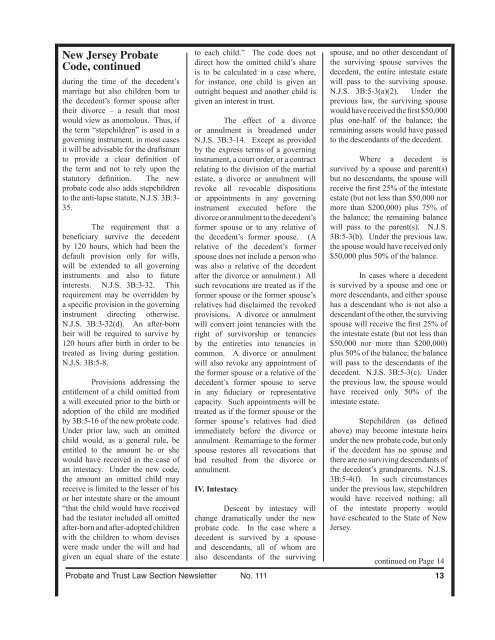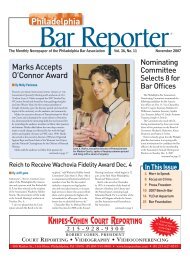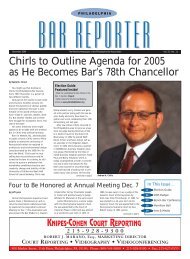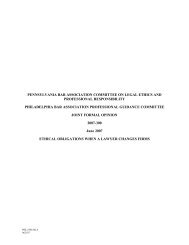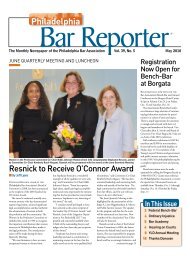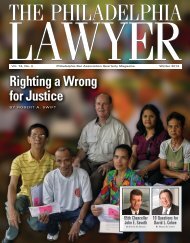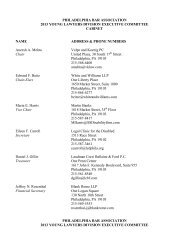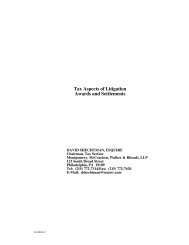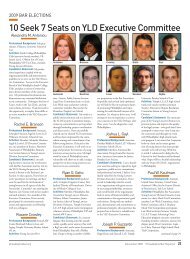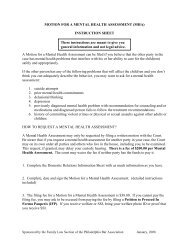Probate & Trust Newsletter: April 2005 - Philadelphia Bar Association
Probate & Trust Newsletter: April 2005 - Philadelphia Bar Association
Probate & Trust Newsletter: April 2005 - Philadelphia Bar Association
Create successful ePaper yourself
Turn your PDF publications into a flip-book with our unique Google optimized e-Paper software.
New Jersey <strong>Probate</strong><br />
Code, continued<br />
during the time of the decedent’s<br />
marriage but also children born to<br />
the decedent’s former spouse after<br />
their divorce – a result that most<br />
would view as anomolous. Thus, if<br />
the term “stepchildren” is used in a<br />
governing instrument, in most cases<br />
it will be advisable for the draftsman<br />
to provide a clear definition of<br />
the term and not to rely upon the<br />
statutory definition. The new<br />
probate code also adds stepchildren<br />
to the anti-lapse statute, N.J.S. 3B:3-<br />
35.<br />
The requirement that a<br />
beneficiary survive the decedent<br />
by 120 hours, which had been the<br />
default provision only for wills,<br />
will be extended to all governing<br />
instruments and also to future<br />
interests. N.J.S. 3B:3-32. This<br />
requirement may be overridden by<br />
a specific provision in the governing<br />
instrument directing otherwise.<br />
N.J.S. 3B:3-32(d). An after-born<br />
heir will be required to survive by<br />
120 hours after birth in order to be<br />
treated as living during gestation.<br />
N.J.S. 3B:5-8.<br />
Provisions addressing the<br />
entitlement of a child omitted from<br />
a will executed prior to the birth or<br />
adoption of the child are modified<br />
by 3B:5-16 of the new probate code.<br />
Under prior law, such an omitted<br />
child would, as a general rule, be<br />
entitled to the amount he or she<br />
would have received in the case of<br />
an intestacy. Under the new code,<br />
the amount an omitted child may<br />
receive is limited to the lesser of his<br />
or her intestate share or the amount<br />
“that the child would have received<br />
had the testator included all omitted<br />
after-born and after-adopted children<br />
with the children to whom devises<br />
were made under the will and had<br />
given an equal share of the estate<br />
to each child.” The code does not<br />
direct how the omitted child’s share<br />
is to be calculated in a case where,<br />
for instance, one child is given an<br />
outright bequest and another child is<br />
given an interest in trust.<br />
The effect of a divorce<br />
or annulment is broadened under<br />
N.J.S. 3B:3-14. Except as provided<br />
by the express terms of a governing<br />
instrument, a court order, or a contract<br />
relating to the division of the martial<br />
estate, a divorce or annulment will<br />
revoke all revocable dispositions<br />
or appointments in any governing<br />
instrument executed before the<br />
divorce or annulment to the decedent’s<br />
former spouse or to any relative of<br />
the decedent’s former spouse. (A<br />
relative of the decedent’s former<br />
spouse does not include a person who<br />
was also a relative of the decedent<br />
after the divorce or annulment.) All<br />
such revocations are treated as if the<br />
former spouse or the former spouse’s<br />
relatives had disclaimed the revoked<br />
provisions. A divorce or annulment<br />
will convert joint tenancies with the<br />
right of survivorship or tenancies<br />
by the entireties into tenancies in<br />
common. A divorce or annulment<br />
will also revoke any appointment of<br />
the former spouse or a relative of the<br />
decedent’s former spouse to serve<br />
in any fiduciary or representative<br />
capacity. Such appointments will be<br />
treated as if the former spouse or the<br />
former spouse’s relatives had died<br />
immediately before the divorce or<br />
annulment. Remarriage to the former<br />
spouse restores all revocations that<br />
had resulted from the divorce or<br />
annulment.<br />
IV. Intestacy<br />
Descent by intestacy will<br />
change dramatically under the new<br />
probate code. In the case where a<br />
decedent is survived by a spouse<br />
and descendants, all of whom are<br />
also descendants of the surviving<br />
spouse, and no other descendant of<br />
the surviving spouse survives the<br />
decedent, the entire intestate estate<br />
will pass to the surviving spouse.<br />
N.J.S. 3B:5-3(a)(2). Under the<br />
previous law, the surviving spouse<br />
would have received the first $50,000<br />
plus one-half of the balance; the<br />
remaining assets would have passed<br />
to the descendants of the decedent.<br />
Where a decedent is<br />
survived by a spouse and parent(s)<br />
but no descendants, the spouse will<br />
receive the first 25% of the intestate<br />
estate (but not less than $50,000 nor<br />
more than $200,000) plus 75% of<br />
the balance; the remaining balance<br />
will pass to the parent(s). N.J.S.<br />
3B:5-3(b). Under the previous law,<br />
the spouse would have received only<br />
$50,000 plus 50% of the balance.<br />
In cases where a decedent<br />
is survived by a spouse and one or<br />
more descendants, and either spouse<br />
has a descendant who is not also a<br />
descendant of the other, the surviving<br />
spouse will receive the first 25% of<br />
the intestate estate (but not less than<br />
$50,000 nor more than $200,000)<br />
plus 50% of the balance; the balance<br />
will pass to the descendants of the<br />
decedent. N.J.S. 3B:5-3(c). Under<br />
the previous law, the spouse would<br />
have received only 50% of the<br />
intestate estate.<br />
Stepchildren (as defined<br />
above) may become intestate heirs<br />
under the new probate code, but only<br />
if the decedent has no spouse and<br />
there are no surviving descendants of<br />
the decedent’s grandparents. N.J.S.<br />
3B:5-4(f). In such circumstances<br />
under the previous law, stepchildren<br />
would have received nothing; all<br />
of the intestate property would<br />
have escheated to the State of New<br />
Jersey.<br />
continued on Page 14<br />
<strong>Probate</strong> and <strong>Trust</strong> Law Section <strong>Newsletter</strong> No. 111 13


